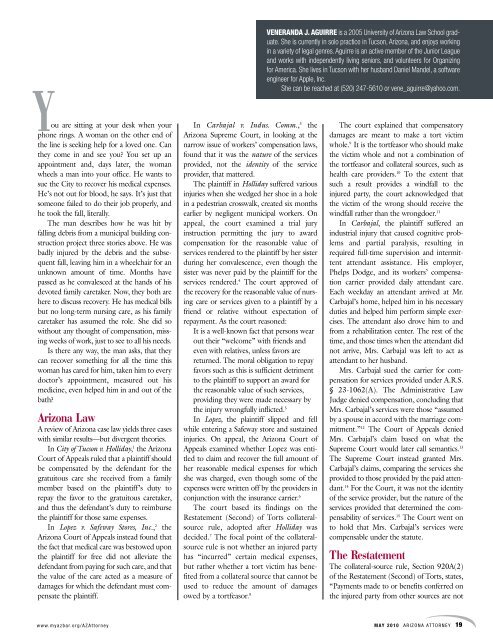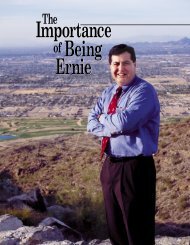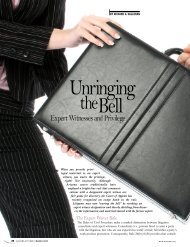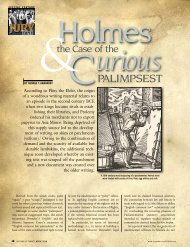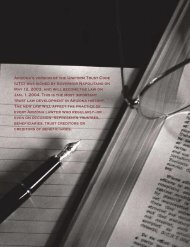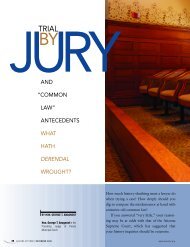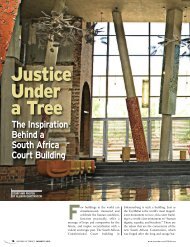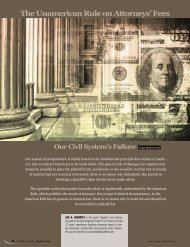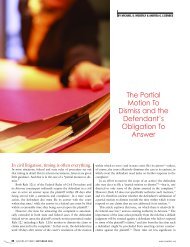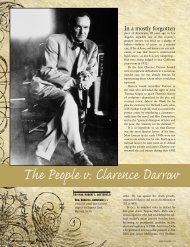The Ties That Bind: Tortfeasors and Family-Provided Care
The Ties That Bind: Tortfeasors and Family-Provided Care
The Ties That Bind: Tortfeasors and Family-Provided Care
Create successful ePaper yourself
Turn your PDF publications into a flip-book with our unique Google optimized e-Paper software.
You are sitting at your desk when your<br />
phone rings. A woman on the other end of<br />
the line is seeking help for a loved one. Can<br />
they come in <strong>and</strong> see you? You set up an<br />
appointment <strong>and</strong>, days later, the woman<br />
wheels a man into your office. He wants to<br />
sue the City to recover his medical expenses.<br />
He’s not out for blood, he says. It’s just that<br />
someone failed to do their job properly, <strong>and</strong><br />
he took the fall, literally.<br />
<strong>The</strong> man describes how he was hit by<br />
falling debris from a municipal building construction<br />
project three stories above. He was<br />
badly injured by the debris <strong>and</strong> the subsequent<br />
fall, leaving him in a wheelchair for an<br />
unknown amount of time. Months have<br />
passed as he convalesced at the h<strong>and</strong>s of his<br />
devoted family caretaker. Now, they both are<br />
here to discuss recovery. He has medical bills<br />
but no long-term nursing care, as his family<br />
caretaker has assumed the role. She did so<br />
without any thought of compensation, missing<br />
weeks of work, just to see to all his needs.<br />
Is there any way, the man asks, that they<br />
can recover something for all the time this<br />
woman has cared for him, taken him to every<br />
doctor’s appointment, measured out his<br />
medicine, even helped him in <strong>and</strong> out of the<br />
bath?<br />
Arizona Law<br />
A review of Arizona case law yields three cases<br />
with similar results—but divergent theories.<br />
In City of Tucson v. Holliday, 1 the Arizona<br />
Court of Appeals ruled that a plaintiff should<br />
be compensated by the defendant for the<br />
gratuitous care she received from a family<br />
member based on the plaintiff’s duty to<br />
repay the favor to the gratuitous caretaker,<br />
<strong>and</strong> thus the defendant’s duty to reimburse<br />
the plaintiff for those same expenses.<br />
In Lopez v. Safeway Stores, Inc., 2 the<br />
Arizona Court of Appeals instead found that<br />
the fact that medical care was bestowed upon<br />
the plaintiff for free did not alleviate the<br />
defendant from paying for such care, <strong>and</strong> that<br />
the value of the care acted as a measure of<br />
damages for which the defendant must compensate<br />
the plaintiff.<br />
w w w. m y a z b a r. o r g / A Z A t t o r n e y<br />
In Carbajal v. Indus. Comm., 3 the<br />
Arizona Supreme Court, in looking at the<br />
narrow issue of workers’ compensation laws,<br />
found that it was the nature of the services<br />
provided, not the identity of the service<br />
provider, that mattered.<br />
<strong>The</strong> plaintiff in Holliday suffered various<br />
injuries when she wedged her shoe in a hole<br />
in a pedestrian crosswalk, created six months<br />
earlier by negligent municipal workers. On<br />
appeal, the court examined a trial jury<br />
instruction permitting the jury to award<br />
compensation for the reasonable value of<br />
services rendered to the plaintiff by her sister<br />
during her convalescence, even though the<br />
sister was never paid by the plaintiff for the<br />
services rendered. 4 <strong>The</strong> court approved of<br />
the recovery for the reasonable value of nursing<br />
care or services given to a plaintiff by a<br />
friend or relative without expectation of<br />
repayment. As the court reasoned:<br />
It is a well-known fact that persons wear<br />
out their “welcome” with friends <strong>and</strong><br />
even with relatives, unless favors are<br />
returned. <strong>The</strong> moral obligation to repay<br />
favors such as this is sufficient detriment<br />
to the plaintiff to support an award for<br />
the reasonable value of such services,<br />
providing they were made necessary by<br />
the injury wrongfully inflicted. 5<br />
In Lopez, the plaintiff slipped <strong>and</strong> fell<br />
while entering a Safeway store <strong>and</strong> sustained<br />
injuries. On appeal, the Arizona Court of<br />
Appeals examined whether Lopez was entitled<br />
to claim <strong>and</strong> recover the full amount of<br />
her reasonable medical expenses for which<br />
she was charged, even though some of the<br />
expenses were written off by the providers in<br />
conjunction with the insurance carrier. 6<br />
<strong>The</strong> court based its findings on the<br />
Restatement (Second) of Torts collateralsource<br />
rule, adopted after Holliday was<br />
decided. 7 <strong>The</strong> focal point of the collateralsource<br />
rule is not whether an injured party<br />
has “incurred” certain medical expenses,<br />
but rather whether a tort victim has benefited<br />
from a collateral source that cannot be<br />
used to reduce the amount of damages<br />
owed by a tortfeasor. 8<br />
VENERANDA J. AGUIRRE is a 2005 University of Arizona Law School graduate.<br />
She is currently in solo practice in Tucson, Arizona, <strong>and</strong> enjoys working<br />
in a variety of legal genres. Aguirre is an active member of the Junior League<br />
<strong>and</strong> works with independently living seniors, <strong>and</strong> volunteers for Organizing<br />
for America. She lives in Tucson with her husb<strong>and</strong> Daniel M<strong>and</strong>el, a software<br />
engineer for Apple, Inc.<br />
She can be reached at (520) 247-5610 or vene_aguirre@yahoo.com.<br />
<strong>The</strong> court explained that compensatory<br />
damages are meant to make a tort victim<br />
whole. 9 It is the tortfeasor who should make<br />
the victim whole <strong>and</strong> not a combination of<br />
the tortfeasor <strong>and</strong> collateral sources, such as<br />
health care providers. 10 To the extent that<br />
such a result provides a windfall to the<br />
injured party, the court acknowledged that<br />
the victim of the wrong should receive the<br />
windfall rather than the wrongdoer. 11<br />
In Carbajal, the plaintiff suffered an<br />
industrial injury that caused cognitive problems<br />
<strong>and</strong> partial paralysis, resulting in<br />
required full-time supervision <strong>and</strong> intermittent<br />
attendant assistance. His employer,<br />
Phelps Dodge, <strong>and</strong> its workers’ compensation<br />
carrier provided daily attendant care.<br />
Each weekday an attendant arrived at Mr.<br />
Carbajal’s home, helped him in his necessary<br />
duties <strong>and</strong> helped him perform simple exercises.<br />
<strong>The</strong> attendant also drove him to <strong>and</strong><br />
from a rehabilitation center. <strong>The</strong> rest of the<br />
time, <strong>and</strong> those times when the attendant did<br />
not arrive, Mrs. Carbajal was left to act as<br />
attendant to her husb<strong>and</strong>.<br />
Mrs. Carbajal sued the carrier for compensation<br />
for services provided under A.R.S.<br />
§ 23-1062(A). <strong>The</strong> Administrative Law<br />
Judge denied compensation, concluding that<br />
Mrs. Carbajal’s services were those “assumed<br />
by a spouse in accord with the marriage commitment.”<br />
12 <strong>The</strong> Court of Appeals denied<br />
Mrs. Carbajal’s claim based on what the<br />
Supreme Court would later call semantics. 13<br />
<strong>The</strong> Supreme Court instead granted Mrs.<br />
Carbajal’s claims, comparing the services she<br />
provided to those provided by the paid attendant.<br />
14 For the Court, it was not the identity<br />
of the service provider, but the nature of the<br />
services provided that determined the compensability<br />
of services. 15 <strong>The</strong> Court went on<br />
to hold that Mrs. Carbajal’s services were<br />
compensable under the statute.<br />
<strong>The</strong> Restatement<br />
<strong>The</strong> collateral-source rule, Section 920A(2)<br />
of the Restatement (Second) of Torts, states,<br />
“Payments made to or benefits conferred on<br />
the injured party from other sources are not<br />
M AY 2 0 1 0 A R I Z O N A AT T O R N E Y<br />
19


